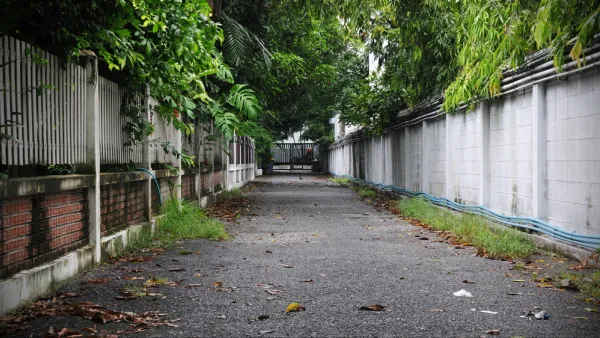A review of the recent "Future of Suburbia" event held at the Center for Advanced Urbanism at the Massachusetts Institute of Technology.

"Whether we are aware of it or not, even the most self-consciously curated 'urban' lives are staged and supplied by the jumbled realm of suburbia," begins an in-depth article by Amada Kolson Hurley examining the recent "Future of Suburbia" event held at the Center for Advanced Urbanism (CAU) at the Massachusetts Institute of Technology (MIT).
Unlike a previous article by Randy Rieland, Kolson Hurley's article offers a more critical reading of the event's proceedings, including the implied criticism of the event's single-minded support of a suburban agenda.
Also present, however, is a sympathetic ear toward the need to have a critical discussion about suburbia, rather than just falling back to the often-elitist biases assumed by self-proclaimed urbanists. "All in all, CAU is making a concerted bid to reposition suburbia as a serious subject of design inquiry," explains Kolson Hurley. "It couldn’t have come soon enough."
Among a detailed account of the event's proceedings, Kolson Hurley also makes a nuanced point about how the event's politics differs from the approache taken by "Reformers," who would retrofit suburbia. Instead, the CAU has created a space for "Validators":
They believe that suburbia is fundamentally OK. They maintain that when people have options, they will usually choose to live in a single-family home in the suburbs, and for intellectuals to resist this is classist and perverse. Validators point out (correctly) that the much-hyped urban revival we keep reading about is mostly limited to affluent white Gen Xers and Millennials. At the conference, economist Jed Kolko analyzed recent census data to show that on the whole, America continues to suburbanize.
To conclude the article, however, Kolson Hurley critiques that framework by noting the neglected subject of environmental impact of suburban land use. That criticism transitions into an appeal for further inquiry and continued effort at finding a common ground for "Reformers," "Validators," and urbanists alike.
FULL STORY: The “Future of Suburbia,” according to MIT

National Parks Layoffs Will Cause Communities to Lose Billions
Thousands of essential park workers were laid off this week, just before the busy spring break season.

Retro-silient?: America’s First “Eco-burb,” The Woodlands Turns 50
A master-planned community north of Houston offers lessons on green infrastructure and resilient design, but falls short of its founder’s lofty affordability and walkability goals.

Delivering for America Plan Will Downgrade Mail Service in at Least 49.5 Percent of Zip Codes
Republican and Democrat lawmakers criticize the plan for its disproportionate negative impact on rural communities.

Test News Post 1
This is a summary

Test News Headline 46
Test for the image on the front page.

Balancing Bombs and Butterflies: How the National Guard Protects a Rare Species
The National Guard at Fort Indiantown Gap uses GIS technology and land management strategies to balance military training with conservation efforts, ensuring the survival of the rare eastern regal fritillary butterfly.
Urban Design for Planners 1: Software Tools
This six-course series explores essential urban design concepts using open source software and equips planners with the tools they need to participate fully in the urban design process.
Planning for Universal Design
Learn the tools for implementing Universal Design in planning regulations.
EMC Planning Group, Inc.
Planetizen
Planetizen
Mpact (formerly Rail~Volution)
Great Falls Development Authority, Inc.
HUDs Office of Policy Development and Research
NYU Wagner Graduate School of Public Service




























